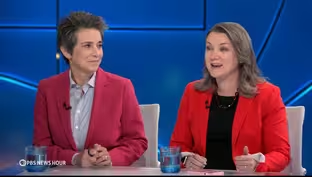
Congress expects Trump request to cut approved funding
Clip: 6/2/2025 | 5m 49sVideo has Closed Captions
Congress expects Trump request to cut funding already approved as big bill faces hurdles
As lawmakers return to Washington, they expect a rescission request from the White House to cut funding already passed by Congress. Among other cuts, President Trump’s request is expected to include the Corporation for Public Broadcasting, the nonprofit through which NPR and PBS get federal funding. Lisa Desjardins reports on what this could look like and what is ahead.
Problems playing video? | Closed Captioning Feedback
Problems playing video? | Closed Captioning Feedback
Major corporate funding for the PBS News Hour is provided by BDO, BNSF, Consumer Cellular, American Cruise Lines, and Raymond James. Funding for the PBS NewsHour Weekend is provided by...

Congress expects Trump request to cut approved funding
Clip: 6/2/2025 | 5m 49sVideo has Closed Captions
As lawmakers return to Washington, they expect a rescission request from the White House to cut funding already passed by Congress. Among other cuts, President Trump’s request is expected to include the Corporation for Public Broadcasting, the nonprofit through which NPR and PBS get federal funding. Lisa Desjardins reports on what this could look like and what is ahead.
Problems playing video? | Closed Captioning Feedback
How to Watch PBS News Hour
PBS News Hour is available to stream on pbs.org and the free PBS App, available on iPhone, Apple TV, Android TV, Android smartphones, Amazon Fire TV, Amazon Fire Tablet, Roku, Samsung Smart TV, and Vizio.
Providing Support for PBS.org
Learn Moreabout PBS online sponsorshipAMNA NAWAZ: As lawmakers return to Washington, they expect what's known as a rescission request to cross their desks in the next 24 hours.
That's a push from the White House to cut funding already passed by Congress.
Among other cuts, President Trump's request is expected to include the Corporation for Public Broadcasting.
It's the nonprofit through which NPR and PBS get federal funding, including for this program.
Our Lisa Desjardins has been reporting on what this could look like and what's ahead in a high-stakes few weeks on the Hill.
Good to see you, Lisa.
LISA DESJARDINS: Yes.
Good to see you.
AMNA NAWAZ: So tell us what we expect in this package of budget cuts and why it matters.
LISA DESJARDINS: First, let's start with why it matters.
This is an important first test for President Trump after months of slashing government without congressional approval.
Now he's going to test what Congress may approve of this, as all of this works through the courts.
Now the question is also, of course, what these cuts would do.
So let's go through my reporting.
Right now, these are round figures.
We haven't gotten the full details yet, but about $8 billion in cuts expected for foreign aid.
That's a fraction of usual annual foreign aid, and about $1 billion in cuts for public broadcasting, the Corporation for Public Broadcasting.
That public broadcasting number, Amna, would be 100 percent of the funding for the Corporation for Public Broadcasting for the next two years.
That would mean great strain on stations around the country.
Republicans, though, argue that it's time for the federal government to get out of that business and for others to pay for it.
AMNA NAWAZ: Lisa, tell us about what's ahead now for the proposal.
I mean, the big question is, does it have the votes to pass?
LISA DESJARDINS: In the House, it does seem that these cuts have the votes to pass.
The Senate is another question.
I'm eager to get up there tomorrow to talk to senators to find out.
But I also want to take people through how this works.
It's an unusual procedure.
First of all, Congress would have 45 days from the minute they get this rescission request after the president submits it to act.
Now, Congress can amend it.
It can pass some, but not all of it.
And there is only a majority vote required in each chamber for these rescissions to take effect.
Now, we do expect things to start in the House, but Senate Majority Leader John Thune said today he wants this to go to the Senate by the end of the month to move quickly.
If either chamber does not agree, then this funding would actually be locked in.
It could not be cut.
AMNA NAWAZ: We know there's been a couple of issues that have been real sticking points for some senators, things like potential Medicaid cuts.
There's also a lot of talk about this contempt provision.
Tell us about that.
LISA DESJARDINS: Right.
I'm happy to take people through this.
First of all, where we are with this bill, it's not just a big bill, and I'm going to keep repeating this.
It is one of the biggest bills in U.S. history.
So what's happening right now is senators are looking at the House bill.
They can only spare three Republican votes in the Senate.
Right now, that House version does not have the votes to pass the Senate.
And I'm going to show you why.
There are a number of concerns.
First of all, there are a group of Republican senators who do not like the deficit effects of this.
They say it would add too much to the debt, another group concerned about Medicaid and the social safety net funding in this, and now an overlapping group as well concerned about the clean energy credits in here, which would be eliminated.
They say their states actually need those energy credits.
Now, as you say, though, there is this other issue getting national attention.
I want to take people deep into the bill.
This is page 514 of the bill.
This is what it says: "No court of the United States may enforce a contempt citation for an injunction or temporary restraining order if no security was given."
What does that mean?
That means that courts could not enforce an order blocking some of Trump's actions if the plaintiffs, those objecting, hadn't put up a bond, essentially, for multimillions of dollars.
And that, in fact, is the case for most of these injunctions right now before the courts.
So a lot of opponents see this as an attempt to block courts and to block that action.
Why haven't we talked about it on this show before?
Because in order to pass the Senate, this bill has to have budgetary effects.
This provision does not have a budgetary effect.
This is expected to be stripped out before the Senate votes.
AMNA NAWAZ: In the meantime, Lisa, you have also been going through the new Trump rules for the federal work force.
Tell us what you found there and how you think could be shifting ahead.
LISA DESJARDINS: This came down Friday after Elon Musk basically was exiting from government.
And this is part of sort of that idea of DOGE trying to cement these effects after he's gone.
It's important.
I read through these, and these changes would have major cultural and workplace place effects in them.
So let's look through them in multiple ways.
First of all, these new federal hiring rules would mean that agencies could no longer collect or give out data on the race or gender of the work force.
They would be encouraged, in fact, told they should recruit from state schools, religious schools, religious groups, the military, and also some other groups like 4-H that are thought to be more rural around the country.
Now, instead of filling out the question as it is now, applications, would have to fill out four short essays.
Two of those would have to deal with the Constitution, but one, every applicant would have to answer a question about how they would comply and support President Trump's executive orders.
Finally, for senior jobs, they are saying there will be a course given that you would have to pay for if you choose to sort of fast-track yourself to become a senior executive, and that course would train people on Trump's executive orders.
So, of course, there are Republicans who say, hey, this is great, government's too elite as it is,we need to look at state schools and others.
But there are other people who say, no, this is politicizing the federal work force in a way that career servants should not be politicized.
So it is something that's happening now, and it's something we need to watch carefully.
AMNA NAWAZ: Lisa Desjardins, thank you very much.
LISA DESJARDINS: You're welcome.
A Brief But Spectacular take on big talk
Video has Closed Captions
Clip: 6/2/2025 | 3m 38s | A Brief But Spectacular take on big talk (3m 38s)
How the Trump administration plans to slash NASA's budget
Video has Closed Captions
Clip: 6/2/2025 | 9m 38s | How the Trump administration's plans to slash NASA's budget will impact science (9m 38s)
News Wrap: 3 killed, dozens hurt heading to Gaza aid site
Video has Closed Captions
Clip: 6/2/2025 | 5m 29s | News Wrap: 3 killed and dozens more hurt heading to Gaza aid distribution site (5m 29s)
Police say makeshift flamethrower used in Boulder attack
Video has Closed Captions
Clip: 6/2/2025 | 3m 52s | Investigators say man used makeshift flamethrower in attack on pro-Israel group in Boulder (3m 52s)
Tamara Keith and Amy Walter on GOP support for Trump budget
Video has Closed Captions
Clip: 6/2/2025 | 9m 24s | Tamara Keith and Amy Walter on Trump's budget and GOP support for cuts (9m 24s)
Ukrainian drone attack deals major blow to Russian bombers
Video has Closed Captions
Clip: 6/2/2025 | 7m 15s | As delegations meet for ceasefire talks, Russia reels from Ukrainian drone attacks (7m 15s)
Providing Support for PBS.org
Learn Moreabout PBS online sponsorshipSupport for PBS provided by:
Major corporate funding for the PBS News Hour is provided by BDO, BNSF, Consumer Cellular, American Cruise Lines, and Raymond James. Funding for the PBS NewsHour Weekend is provided by...

















